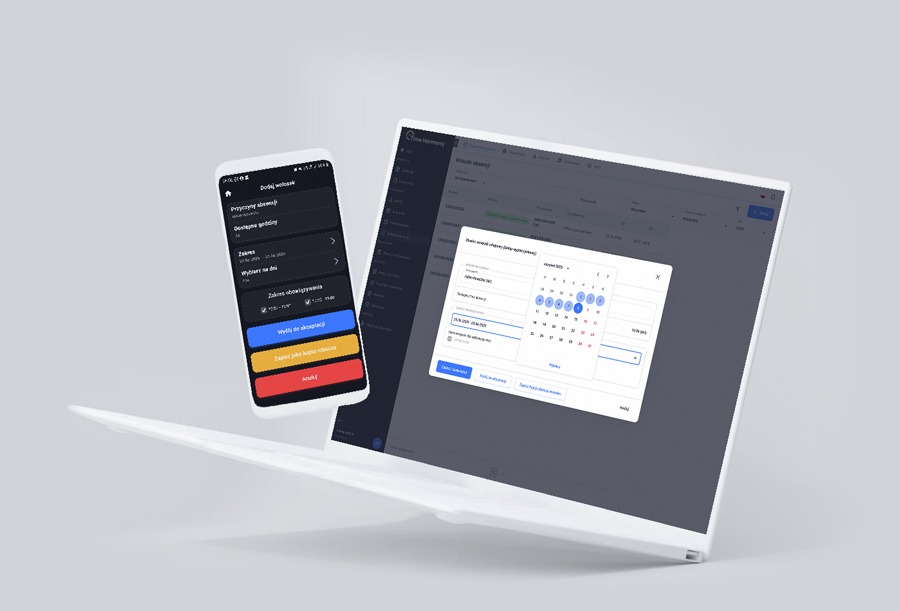The challenge of managing contractor work hours
Maintaining a reliable work hours tracking for contractors process is a recurring challenge for many businesses. Unlike employees, contractors operate under civil law agreements, which means they are not subject to the Labor Code. However, keeping an accurate contractor work hours log is essential for proper invoicing, cost control, and performance evaluation.
Manual tracking using spreadsheets or paper timesheets often leads to inconsistencies, errors, and data duplication. As a result, companies lose valuable time on administrative tasks instead of focusing on efficiency and profitability.
What the Civil Code says about service contracts
Under the Polish Civil Code (Articles 734–751), a service contract (known as umowa zlecenie) obliges the contractor to perform a specific task for the client. According to these articles:
- The contractor must act diligently and in accordance with the agreement (Art. 734).
- They may be liable for improper performance (Art. 746).
- They are entitled to remuneration and reimbursement of justified expenses (Arts. 750–751).
Although the Civil Code does not require maintaining a contractor work hours log, businesses must still document how the work was performed and for how long. This ensures accountability and accurate settlements between parties.
How to maintain a contractor work hours record effectively
Why traditional timesheets are no longer enough
Many companies still rely on paper timesheets for service contracts or attendance lists to confirm the number of hours worked. This method might suffice for small teams, but it quickly becomes inefficient when managing multiple contractors or projects simultaneously.
Traditional timesheets also lack visibility — they don’t show which task, client, or project each contractor worked on. This creates challenges for cost allocation, performance evaluation, and future planning.
Summary: Manual timesheets for service contracts do not provide the data accuracy or analytical value needed for modern contractor management.
How a time tracking system simplifies contractor management
The Time Harmony system automates work hours tracking for contractors and integrates data across projects. Each work session is registered in real time and linked to:
- a specific service contract or task,
- a client or contractor account,
- a location or project.
This allows managers to access detailed contractor work hours logs, compare planned versus actual time spent, and evaluate performance objectively.
Automating contractor time tracking with Time Harmony
With Time Harmony, work hours tracking for contractors becomes fully automated and transparent. The system records start and end times, breaks, and task types while linking each contractor to a specific project or client. It also allows businesses to analyze:
- workload distribution,
- seasonal trends,
- location-based performance,
- and resource utilization.
This is especially valuable for logistics, service, and warehouse companies where workload fluctuates seasonally or project-based work is the norm.
Performance reports and data comparison – the key to better planning
One of the strongest features of Time Harmony is its advanced contractor performance reports. These reports provide detailed insight into:
- total hours worked per project or client,
- efficiency and productivity levels,
- performance comparison between teams, locations, or seasons.
With these analytics, companies can not only manage current contracts but also:
- forecast resource needs for future projects,
- plan recruitment based on historical performance,
- and identify high-performing contractors for repeat engagements.
Time Harmony – comprehensive support for contractor time tracking and settlements
The Time Harmony RCP system is more than just a time-tracking tool. It’s a complete solution for managing contractors and optimizing operational efficiency. The platform enables:
- full work hours tracking for contractors,
- assigning contractors to specific projects, clients, or locations,
- generating contractor performance reports and comparative data,
- analyzing seasonality and workload fluctuations.
Companies using Time Harmony gain data-driven insight into costs, performance, and workforce needs — transforming work hours tracking for contractors from an administrative burden into a source of strategic business intelligence.
Key takeaways
- Work hours tracking for contractors ensures accurate settlements, transparency, and better cost control.
- Time Harmony automates tracking, assigns contractors to specific projects and clients, and generates detailed reports.
- The system provides valuable insights into performance, efficiency, and seasonality.
- Businesses save time, eliminate errors, and strengthen control over contract execution.
Contact us & see how Time Harmony automates work hours tracking for contractors and helps your company optimize contractor performance and project costs.

Easily manage your company's working time
